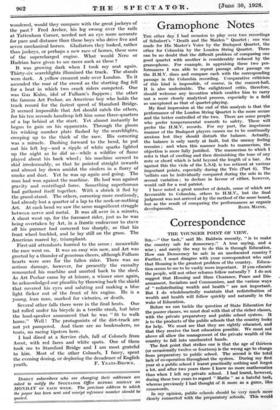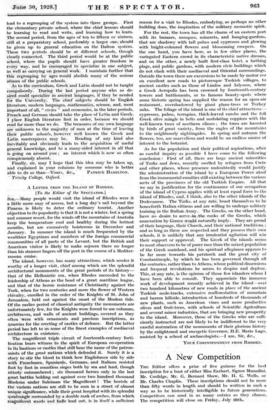Correspondence
THE YOUNGER POINT OF VIEW.
Snt,—" Our task," said Mr. Baldwin recently, " is to make the country safe for democracy." A true saying, and a wise ; and surely the way to do this is through Education. How can Democracy be safe in an uneducated country ? Further, I must disagree with your correspondent who said that Housing is the greatest problem of the country. Educa- tion seems to me to be vastly more important. If you educate the people, will not other reforms follow naturally ? I do not suggest that Housing and Slum Clearance, Peace and Dis- armament, Socialism and Communism, and the various ways of " redistributing wealth and health " are not important. But I do wholeheartedly maintain that redistribution of wealth and health will follow quickly and naturally in the wake of Education.
Before we can tackle the question of State Education for the poorer classes, we must deal with that of the richer classes, with the private preparatory and public school system. It is to the products of the public schools that the country look for help. We must see that they are rightly educated, and that they receive the best education possible. We must not above all allow the management of the private wealth of the country to fall into uneducated hands. The first point that strikes one is that the age of thirteen (or occasionally twelve or fourteen) is the wrong age to change from preparatory to public school. The second is the total lack of co-operation throughout the system. During my first year at a public school I learnt practically nothing and forgot a lot, and after two years there I knew no more mathematics than when I left my private school. I had learnt, however, during these two years to regard " Maths " as a hateful task, whereas previously I had thought of it more as a game, like crosswords.
In my opinion, public schools should be -very much more closely connected with the preparatory schools. This wonld
lead to a regrouping of the system into three groups..., First the elementary private school, where the chief lessons should be learning to read and write, and learning hOW to learn. The second period, from the ages of ten to fifteen or sixteen, still at a preparatory school, preferably a -larger one; should be given up to general education on the Dalton system. These two periods .should be at different Schools, though CloselY connected.. The third period *Mild be at the public School, where the pupils . should haVe greater freedoin -in every -way, and be encouraged to specialize in one subject, as well as carrying on general Work: I maintain furthei that thiS regrouping !,3,i ages would abolish many of the serious 0buses of the public schoirls; ' As to the eurriculUm; Greek and Latin should not be taught CoirifailSorily. :During the kit period anyOne who so de- sired could specialize in ancient languages, if they be needed for the University. The :chief subjects ShOtild be English literature, modern languages, inathematies", science, and, most iMpOrtant of all; " civics " and eeirnomiei; irithe later periods. French and Cernan Shorild-take the place of Latin and Greek. I place Eitglish literature first in Order; because we shOuld read far more thanwe do. The treasures of orn. own language are unknown to the majority of -Men at the.tiine of leaVing their public schools, hOwe'ver: well knoWn the Greek and Latin masterpieces may be.: Reading .-Of any kind also inevitably and ObviOnslY leads to the acquisition of useful general knowledge, and to :a many-sided interest in all that is going on around you ; an interest whichle now so often conspicuously absent.
Finally, sir, may I hope that this idea may be taken up, and explained in your columns by someone ivho: is better









































 Previous page
Previous page